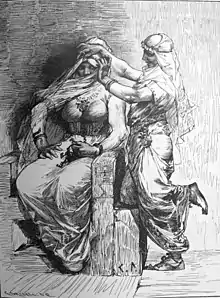Þrymskviða
Þrymskviða (Þrym's Poem;[1][2] the name can be anglicised as Thrymskviða, Thrymskvitha, Thrymskvidha or Thrymskvida) is one of the best known poems from the Poetic Edda. The Norse myth had enduring popularity in Scandinavia and continued to be told and sung in several forms until the 19th century.


Synopsis
The giant Þrymr steals Thor's hammer Mjölnir and demands Freyja as payment for it, desiring the goddess as his own wife. Thor initially asks Freyja to prepare herself to marry Þrymr, though she quickly refuses. Instead of Freyja, the Æsir dress Thor as the bride and Loki as the bridesmaid, and the two travel to Jötunheimr for the "wedding." Thor's identity is comically hinted at throughout the reception (the god eats an entire ox on his own, for example), with Loki providing weak explanations that the giants somehow accept for the odd behavior (he claims that the bride's immense hunger stems from her not having eaten for the last seven days for her excitement). Mjölnir is eventually placed into Thor's hands as part of the wedding ceremony, allowing the god to strike down the giants and return home.
Analysis
There is no agreement among scholars on the age of Þrymskviða. Some have seen it as thoroughly heathen and among the oldest of the Eddaic poems. Others have seen it as a young Christian parody of the heathen gods.[3]
In other tales, Loki's explanations for Thor's behavior has its clearest analogies in the tale Little Red Riding Hood, where the wolf provides equally odd explanations for its differences from the grandmother than Little Red Riding Hood was expecting.[4]
Songs
Parts of the story related in Þrymskviða remained in the Thor song, a song which is known from Scandinavia and of which there are Swedish accounts from the 17th century to the 19th century. In this song, Thor is called Torkar, Loki is called Locke Lewe, Freyja is called Miss Frojenborg and Þrymr is called Trolletrams.
A 15th century Icelandic rímur cycle, Þrymlur, relates the same story and is evidently based on Þrymskviða.
Opera
The first full-length Icelandic opera, Jón Ásgeirsson's Þrymskviða, was premiered at Iceland's National Theater in 1974. The libretto is based on the text of the poem Þrymskviða, but also incorporates material from several other Eddic poems.[5]
Icelandic statue

A seated bronze statue of Thor (about 6.4 cm) known as the Eyrarland statue from about AD 1000 was recovered at a farm near Akureyri, Iceland and is a featured display at the National Museum of Iceland. Thor is holding Mjöllnir, sculpted in the typically Icelandic cross-like shape. It has been suggested that the statue is related to a scene from Þrymskviða where Thor recovers his hammer while seated by grasping it with both hands during the wedding ceremony.[6]
References
- Britt-Mari Näsström (2013). "Old Norse Religion". In Christensen, Lisbeth Bredholt; Hammer, Olav; Warburton, David (eds.). The Handbook of Religions in Ancient Europe. Durham: Acumen Publishing. pp. 324–337. ISBN 9781844657100.
- Quinn, Judy; Cipolla, Adele (2016). Studies in the Transmission and Reception of Old Norse Literature: The Hyperborean Muse in European Culture. Turnhout: Brepols Publishers. ISBN 978-2-503-55553-9.
- De Vries, Jan (2008) [First published 1938]. Boon-de Vries, Aleid; Huisman, J.A. (eds.). Edda - Goden- en heldenliederen uit de Germaanse oudheid. Deventer, Netherlands: Ankh-Hermes bv. pp. 101–102. ISBN 978-90-202-4878-4.
- Iona and Peter Opie, The Classic Fairy Tales, p. 93-4 ISBN 0-19-211559-6.
- Nagy, Peter; Rouyer, Phillippe; Rubin, Don (2013). World Encyclopedia of Contemporary Theatre: Volume 1: Europe. Routledge. p. 461. ISBN 9781136402968.
- Ross, Margaret Clunies (2002). "Reading Þrymskviða". In Acker, Paul; Larrington, Carolyne (eds.). The Poetic Edda: Essays on Old Norse Mythology. London: Routledge. pp. 188–189. ISBN 0-8153-1660-7.
Other sources
- Schön, Ebbe. Asa-Tors hammare. Fälth & Hässler, Värnamo 2004.
External links
| Wikisource has original text related to this article: |
| Wikimedia Commons has media related to Þrymskviða. |
- Þrymskviða in Old Norse from heimskringla.no
- The Scandinavian Thor songs and Þrymlur from heimskringla.no
- An English translation of Þrymskviða
- Text of Þrymskviða with an English marginal glossary